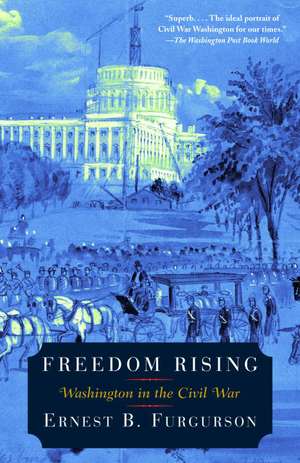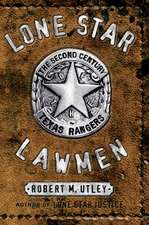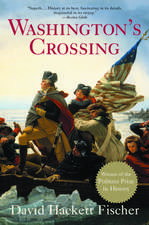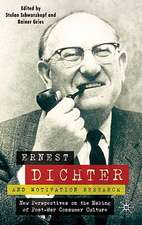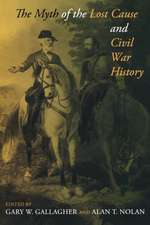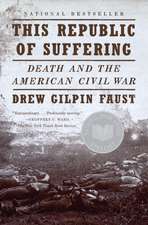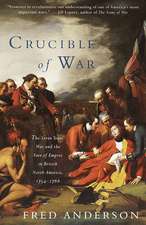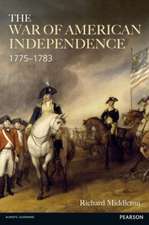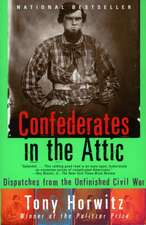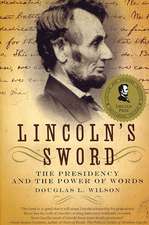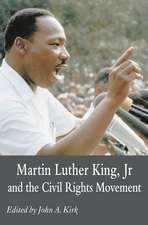Freedom Rising: Washington in the Civil War: Vintage Civil War Library
Autor Ernest B. Furgursonen Limba Engleză Paperback – 31 oct 2005
Din seria Vintage Civil War Library
-
 Preț: 102.62 lei
Preț: 102.62 lei -
 Preț: 107.63 lei
Preț: 107.63 lei -
 Preț: 121.68 lei
Preț: 121.68 lei -
 Preț: 109.32 lei
Preț: 109.32 lei -
 Preț: 139.90 lei
Preț: 139.90 lei -
 Preț: 136.71 lei
Preț: 136.71 lei -
 Preț: 136.30 lei
Preț: 136.30 lei -
 Preț: 100.24 lei
Preț: 100.24 lei -
 Preț: 125.54 lei
Preț: 125.54 lei -
 Preț: 134.74 lei
Preț: 134.74 lei -
 Preț: 122.76 lei
Preț: 122.76 lei -
 Preț: 99.36 lei
Preț: 99.36 lei -
 Preț: 143.78 lei
Preț: 143.78 lei -
 Preț: 133.47 lei
Preț: 133.47 lei -
 Preț: 100.42 lei
Preț: 100.42 lei -
 Preț: 149.08 lei
Preț: 149.08 lei -
 Preț: 116.64 lei
Preț: 116.64 lei -
 Preț: 144.04 lei
Preț: 144.04 lei -
 Preț: 196.43 lei
Preț: 196.43 lei -
 Preț: 115.32 lei
Preț: 115.32 lei -
 Preț: 117.18 lei
Preț: 117.18 lei -
 Preț: 105.40 lei
Preț: 105.40 lei -
 Preț: 198.45 lei
Preț: 198.45 lei -
 Preț: 117.10 lei
Preț: 117.10 lei -
 Preț: 99.14 lei
Preț: 99.14 lei -
 Preț: 98.10 lei
Preț: 98.10 lei -
 Preț: 110.75 lei
Preț: 110.75 lei - 18%
 Preț: 71.23 lei
Preț: 71.23 lei - 16%
 Preț: 80.42 lei
Preț: 80.42 lei -
 Preț: 102.90 lei
Preț: 102.90 lei -
 Preț: 102.69 lei
Preț: 102.69 lei
Preț: 144.52 lei
Nou
Puncte Express: 217
Preț estimativ în valută:
27.65€ • 28.95$ • 22.88£
27.65€ • 28.95$ • 22.88£
Carte disponibilă
Livrare economică 15-29 martie
Preluare comenzi: 021 569.72.76
Specificații
ISBN-13: 9780375704093
ISBN-10: 0375704094
Pagini: 463
Ilustrații: 16 PP B&W
Dimensiuni: 129 x 207 x 27 mm
Greutate: 0.51 kg
Editura: Vintage Books USA
Seria Vintage Civil War Library
ISBN-10: 0375704094
Pagini: 463
Ilustrații: 16 PP B&W
Dimensiuni: 129 x 207 x 27 mm
Greutate: 0.51 kg
Editura: Vintage Books USA
Seria Vintage Civil War Library
Notă biografică
Ernest B. “Pat” Furgurson, formerly a correspondent and columnist for the Baltimore Sun, has spent most of his life in the nation’s capital. A native of Virginia, he is also the author of Chancellorsville 1863, Ashes of Glory, and Not War but Murder. He lives in Washington, D.C.
Extras
Chapter One
God Alone Can Avert the Storm
Burn the building! Burn it down!"
Hiding on the roof of the ransacked Tremont House, three blocks from the United States Capitol, a handful of scared young Lincolnites peeked down at the shouting mob in the street, sure that they were in mortal danger.
All that fall of 1860, boisterous Republicans who called themselves "Wide-Awakes" had marched along the avenues of other northern cities in black oilcloth capes and caps, waving torches and carrying fence rails to show their enthusiasm for their candidate, the Great Rail-Splitter. But in Washington, surrounded by Southern partisans, they had kept quiet until the last weeks of the presidential campaign, when Abraham Lincoln's victory seemed more and more likely. Then, sure that history was with them, some 500 paraded openly, with a few blacks tagging along behind. As they strode along Pennsylvania Avenue, they defied showers of rocks and taunts from proslavery ruffians shouting "Damn niggers! They oughtn't to be allowed on the streets." Late on November 6, the Wide-Awakes gathered to greet the election returns at the Tremont House, at Second Street and Indiana Avenue, the former office of the National Era, which had serialized Harriet Beecher Stowe's Uncle Tom's Cabin eight years earlier. Now the building was headquarters for local Republicans, who called it their "wigwam," after the Chicago hall where Lincoln had been nominated the previous May.
Loud as some Washingtonians were, they had no legal voice in what was coming; they could not vote for president, so all their excitement was focused on the returns from elsewhere. Pennsylvania Avenue, Seventh Street and C Street were alive that night with people streaming from one hotel to another, one political club to another, looking for news and free whiskey. An anxious crowd surrounded the telegraph office on Fourteenth Street, awaiting the figures from crucial New York, and another watched results posted on the bulletin board outside the National Hotel. At the theater on E Street, in the city where he had made his stage debut at the age of four with a blackface comedian called Jim Crow, the wildly popular Joe Jefferson was playing to a full house. He repeatedly interrupted his performance to announce the latest election returns; the audience cheered each Democratic upswing and hissed at Republican successes. At the Democratic Jackson Association (derided by opponents as the "Dem. Jack. Ass."), misleading early bulletins encouraged officers to send for a brass band to lead a triumphant parade. But after tuning up, the musicians slumped away when the hard truth set in. Disappointed losers then milled around Brown's Hotel, the traditional base of Southern legislators, where one young gladiator dared anybody to admit being "a damned black Republican," thus setting off a mass scrimmage that left noses bloody. When police broke up the melee, the crowd surged toward the Republican wigwam.
By that time, half an hour after midnight, the news that Pennsylvania had gone Republican spread up and down the Avenue: Abe Lincoln would become the sixteenth president of the United States. The jubilant Wide-Awakes were celebrating with songs and speeches when one of their members rushed in shouting that the gang of frustrated Democratic toughs, many of them from the secessionist National Volunteers militia company, were on their way to tear down the Republican clubhouse. The Lincoln boosters quickly scattered, leaving behind only a handful of their officers, who turned out the gaslights and locked the doors.
When the fighting-drunk mob arrived, it let go three loud cheers, then started firing pistols and throwing rocks, smashing windows and breaking in doors. The few remaining Republicans retreated to the second floor, then the third, then the roof, where they armed themselves with bricks from the chimney to hold off the intruders. But the mob was busy wrecking the building's interior, pitching furniture out the windows, ripping up banners, ransacking club records, smashing statuettes of Lincoln and his vice presidential running mate, Hannibal Hamlin of Maine. When police arrived, rioters leaped down stairwells and out windows to escape, but once outside they re-formed and began chanting "Burn the building! Burn it down!" The Wide-Awakes trapped on the roof were finally saved when the police arrested a batch of the wreckers and drove the rest away. Even then the mob marched off defiantly, filling the street from curb to curb, shouting allegiance to the National Volunteers, until at last its energy flickered out in the approaching dawn.
In the most momentous election in the nation's history, Lincoln had won only 39.9 percent of the popular ballots but 59.4 percent of the electoral vote, against a divided field: the Northern Democrat, Senator Stephen A. Douglas of Illinois; the Southern Democrat, Vice President John C. Breckinridge of Kentucky; and the Constitutional Unionist, former Senator John Bell of Tennessee. The result inspired more political turbulence than celebration in a capital dominated by Marylanders, Virginians and the Southern Democrats who had held power for most of the previous decade. The day after the vote was confirmed, a North Carolinian in the capital wrote to friends back home that the election of the "Black Republican" Lincoln was "the greatest calamity that has ever befallen the United States. The sun that rose on Tuesday morning cast its bright rays upon a powerful & noble Republic, in the evening it went down on a ruined, tattered Union, for such I believe will be the result."
Both Virginia and Maryland, the two states that enclose the capital on the Potomac, had rejected Lincoln by overwhelming margins. Hotheaded politicians farther south immediately started moves toward secession; some of the ultras among them had spoken secretly of mounting a coup to prevent the president-elect from taking office. The National Volunteers, whose rioting members had tried to burn down Republican headquarters, would be heard from again and again. Extremists on both sides took spirit from the emergency; the roar from Southern militants antagonized radical abolitionists up north. But Washingtonians, most of them, epitomized the millions of conservative Americans in between, who were more alarmed than exhilarated by the clamor.
At the Capitol, surrounded by construction sheds, scaffolding, iron girders and scattered columns of marble, Thomas Ustick Walter was near despair. "Our country is in the midst of a terrible partisan conflict," he told his son-in-law, "and we are in the vortex of it."
Walter was a tall, imposing Philadelphian, his German-American roots deep in the North. But he was torn. He had been appointed architect of the Capitol by a Whig president and kept in his prestigious job by two Democrats. As tension rose, he wrote that "the North looks to me to be insane. [It is] mere stinking pride of opinion that is this moment moving on to allow the country to be deluged in blood."
"I have no idea that there will be any appropriation this winter for public works," he wrote-and so the climactic mission of his distinguished career, building the new dome that he had just redesigned, might stop before it was well started. Vendors could still hawk fruit, beer and souvenirs within the hallways of the Capitol, and members of Congress could still trade votes in their hideaway watering holes. But Walter feared that work on the new House and Senate wings would halt and the Capitol would stand as it was, seeming decapitated, leaking around the edges of new construction, some of its brick walls without their marble facings, its niches without their statues.
If war came, Walter wrote, he might even leave the country, to "try how it goes to live under an autocrat; Russia is the place." Perhaps he was remembering how the Italian architect Francesco Bartolomeo Rastrelli had conceived so many of the masterpieces of Peter the Great's capital. "If I knew the language, I believe I would make straight for St. Petersburg the moment our politicians 'break the machine.' . . .
"God alone can avert the storm," Walter wrote. "We must trust in Him."
But on the Senate floor, Benjamin Franklin Wade, an irrepressible antislavery senator from Ohio, backed up his confidence in the Almighty. Remembering how his abolitionist colleague Charles Sumner of Massachusetts was caned near to death a few desks away by the South Carolina Congressman Preston Brooks, he made known that any Southern fire-eater who threatened or insulted him would be invited to duel-with rifles, at twenty paces, with paper targets the size of silver dollars over each man's heart.
For four weeks after the election, Southern voices in the capital were even more dominant than usual, because Congress was in recess. Until the legislature returned, most of the politicians on hand were Democratic bureaucrats and supplicants, whose party had controlled the White House and thus patronage through the Franklin Pierce and James Buchanan administrations. Between the election and Congress's return, Buchanan called two meetings of his ideologically split cabinet, and reached no consensus at all on how to deal with the situation. But in the cabinet, in the saloons and in Congress when it returned, the focus of debate had shifted from expansion of slavery to the right of secession, and the use of Federal force to prevent it.
The legalistic Buchanan, whom one fellow Democrat had called "that damned old wry-necked, squinty-eyed, white-livered scoundrel who disgraces the White House with his presence," was squeezed from both sides. He had come to the job with what seemed eminent qualifications: after service in the War of 1812, he had been elected to the Pennsylvania legislature in 1814, spent ten years as a congressman and ten years as a senator, then become minister to Russia, secretary of state, and minister to Great Britain, and was three times an unsuccessful contender for the Democratic presidential nomination before finally winning it and the election of 1856. But now, in a crisis potentially mortal to the Union, that matchless experience failed him. In his tensely awaited State of the Union message to Congress, the sixty-nine-year-old president infuriated Republicans by asserting that "the long-continued and intemperate interference of the Northern people with the question of slavery in the Southern States has at length produced its natural effects." But, still trying to have it both ways, he added that the election of any particular candidate was no just cause for dissolving the Union. Secession, he said, was unconstitutional-but the Federal government had no right to prevent it by force.
To South Carolina, this was a green light to proceed. All eyes turned to Columbia, where the state legislature had scheduled a secession convention to begin December 17. Far less attention was paid to Springfield, Illinois, where President-elect Lincoln carefully said little beyond warning against compromise on the extension of slavery, and making clear how unhappy he was that Buchanan had blamed the free states for the crisis.
Washington, like the shaky president, was caught in the middle. In 1860, the District of Columbia had only 75,080 persons, 61,122 of them in Washington City, 8,733 in Georgetown and 5,225 in the rural remainder of the District. Of the total, 11,131 were free blacks and 3,185 slaves. Sixteen percent of the population was born in Virginia, 14 percent in Maryland, and most of the 47 percent born in the District was from families in those states. Slaves and ex-slaves were governed by the local "black code," which duplicated the laws of slaveholding Maryland when the District was created in 1791. It required free African-Americans to carry a residence permit, without which they risked being sold into slavery, and dictated the way blacks could assemble, worship, drive carriages, race horses, swim in the Potomac, or walk abroad after 10 p.m. Despite such restrictions, a few free blacks had prospered as restaurateurs and merchants. One of them, the caterer James T. Wormley, was General-in-Chief Winfield Scott's landlord.
The Virginia city of Alexandria, part of the original ten-mile-square District of Columbia laid out by George Washington, had been returned to state jurisdiction in 1846. But Georgetown, a former Maryland tobacco port half a century older than the capital city, was still a separate town within the District. Hemmed in by Rock Creek on the east, Georgetown College on the west, and Oak Hill Cemetery to the north, its population increased by only 400 in the 1850s, while Washington's grew by more than 23,000.* But while Georgetown's growth and commerce seemed stagnant, its role in society was undisturbed. There and downtown near the White House and Lafayette Square lived most of the local establishment-old-line families, ranking politicians, high military officers, and a diplomatic corps whose principals and staff together numbered just forty-four bodies. In this fashionable circle, etiquette followed the traditions of the slave-owning chivalry of nearby counties.
Politicians moving between White House and Congress, crinolined ladies moving from receptions to balls and recitals, ne'er-do-wells offering shady deals to visitors, all had to traverse streets deep with mud and muck in winter and clouded by dust in summer. Washington's unfinished Capitol stood above an unfinished city; less than seventy years before, the place had been woods, swamps and tobacco fields. Its few monumental government buildings and broad avenues were far out of scale with its scattered brick townhouses, rows of low-rise hotels and squalid slums of blacks and immigrants. Cattle, pigs and geese roamed free over broad empty stretches, including the acreage around the square stub of the Washington Monument, where indecision, vandalism and politics had halted construction at the 156-foot level. Close by, on what is now called the Ellipse, the Baltimore Excelsiors had defeated the Washington Potomacs 40 to 24 the previous June, in the first intercity baseball game played outside the New York area. Only Pennsylvania Avenue and the adjacent stretch of Seventh Street were paved, with broken cobblestones. Along more than a mile of "the Avenue" between the Capitol and the White House, the conglomerate rest of Washington tested the credulity of innocent visitors and the wit of writers like Dr. George William Bagby.
The city "is the paradise of paradoxes," Bagby wrote-"a great, little, splendid, mean, extravagant, poverty-stricken barrack. . . . The one and only absolutely certain thing is the absence of everything that is at all permanent." In his cubbyhole office on newspaper row, across Fourteenth Street from Willard's Hotel, Bagby whipped out dispatches for the cosmopolitan readers of the New Orleans Crescent and the Richmond Dispatch. A Virginian, a physician by training, he preferred his incisive pen to the lancet, delighting in the ripple of his own words.
From the Hardcover edition.
God Alone Can Avert the Storm
Burn the building! Burn it down!"
Hiding on the roof of the ransacked Tremont House, three blocks from the United States Capitol, a handful of scared young Lincolnites peeked down at the shouting mob in the street, sure that they were in mortal danger.
All that fall of 1860, boisterous Republicans who called themselves "Wide-Awakes" had marched along the avenues of other northern cities in black oilcloth capes and caps, waving torches and carrying fence rails to show their enthusiasm for their candidate, the Great Rail-Splitter. But in Washington, surrounded by Southern partisans, they had kept quiet until the last weeks of the presidential campaign, when Abraham Lincoln's victory seemed more and more likely. Then, sure that history was with them, some 500 paraded openly, with a few blacks tagging along behind. As they strode along Pennsylvania Avenue, they defied showers of rocks and taunts from proslavery ruffians shouting "Damn niggers! They oughtn't to be allowed on the streets." Late on November 6, the Wide-Awakes gathered to greet the election returns at the Tremont House, at Second Street and Indiana Avenue, the former office of the National Era, which had serialized Harriet Beecher Stowe's Uncle Tom's Cabin eight years earlier. Now the building was headquarters for local Republicans, who called it their "wigwam," after the Chicago hall where Lincoln had been nominated the previous May.
Loud as some Washingtonians were, they had no legal voice in what was coming; they could not vote for president, so all their excitement was focused on the returns from elsewhere. Pennsylvania Avenue, Seventh Street and C Street were alive that night with people streaming from one hotel to another, one political club to another, looking for news and free whiskey. An anxious crowd surrounded the telegraph office on Fourteenth Street, awaiting the figures from crucial New York, and another watched results posted on the bulletin board outside the National Hotel. At the theater on E Street, in the city where he had made his stage debut at the age of four with a blackface comedian called Jim Crow, the wildly popular Joe Jefferson was playing to a full house. He repeatedly interrupted his performance to announce the latest election returns; the audience cheered each Democratic upswing and hissed at Republican successes. At the Democratic Jackson Association (derided by opponents as the "Dem. Jack. Ass."), misleading early bulletins encouraged officers to send for a brass band to lead a triumphant parade. But after tuning up, the musicians slumped away when the hard truth set in. Disappointed losers then milled around Brown's Hotel, the traditional base of Southern legislators, where one young gladiator dared anybody to admit being "a damned black Republican," thus setting off a mass scrimmage that left noses bloody. When police broke up the melee, the crowd surged toward the Republican wigwam.
By that time, half an hour after midnight, the news that Pennsylvania had gone Republican spread up and down the Avenue: Abe Lincoln would become the sixteenth president of the United States. The jubilant Wide-Awakes were celebrating with songs and speeches when one of their members rushed in shouting that the gang of frustrated Democratic toughs, many of them from the secessionist National Volunteers militia company, were on their way to tear down the Republican clubhouse. The Lincoln boosters quickly scattered, leaving behind only a handful of their officers, who turned out the gaslights and locked the doors.
When the fighting-drunk mob arrived, it let go three loud cheers, then started firing pistols and throwing rocks, smashing windows and breaking in doors. The few remaining Republicans retreated to the second floor, then the third, then the roof, where they armed themselves with bricks from the chimney to hold off the intruders. But the mob was busy wrecking the building's interior, pitching furniture out the windows, ripping up banners, ransacking club records, smashing statuettes of Lincoln and his vice presidential running mate, Hannibal Hamlin of Maine. When police arrived, rioters leaped down stairwells and out windows to escape, but once outside they re-formed and began chanting "Burn the building! Burn it down!" The Wide-Awakes trapped on the roof were finally saved when the police arrested a batch of the wreckers and drove the rest away. Even then the mob marched off defiantly, filling the street from curb to curb, shouting allegiance to the National Volunteers, until at last its energy flickered out in the approaching dawn.
In the most momentous election in the nation's history, Lincoln had won only 39.9 percent of the popular ballots but 59.4 percent of the electoral vote, against a divided field: the Northern Democrat, Senator Stephen A. Douglas of Illinois; the Southern Democrat, Vice President John C. Breckinridge of Kentucky; and the Constitutional Unionist, former Senator John Bell of Tennessee. The result inspired more political turbulence than celebration in a capital dominated by Marylanders, Virginians and the Southern Democrats who had held power for most of the previous decade. The day after the vote was confirmed, a North Carolinian in the capital wrote to friends back home that the election of the "Black Republican" Lincoln was "the greatest calamity that has ever befallen the United States. The sun that rose on Tuesday morning cast its bright rays upon a powerful & noble Republic, in the evening it went down on a ruined, tattered Union, for such I believe will be the result."
Both Virginia and Maryland, the two states that enclose the capital on the Potomac, had rejected Lincoln by overwhelming margins. Hotheaded politicians farther south immediately started moves toward secession; some of the ultras among them had spoken secretly of mounting a coup to prevent the president-elect from taking office. The National Volunteers, whose rioting members had tried to burn down Republican headquarters, would be heard from again and again. Extremists on both sides took spirit from the emergency; the roar from Southern militants antagonized radical abolitionists up north. But Washingtonians, most of them, epitomized the millions of conservative Americans in between, who were more alarmed than exhilarated by the clamor.
At the Capitol, surrounded by construction sheds, scaffolding, iron girders and scattered columns of marble, Thomas Ustick Walter was near despair. "Our country is in the midst of a terrible partisan conflict," he told his son-in-law, "and we are in the vortex of it."
Walter was a tall, imposing Philadelphian, his German-American roots deep in the North. But he was torn. He had been appointed architect of the Capitol by a Whig president and kept in his prestigious job by two Democrats. As tension rose, he wrote that "the North looks to me to be insane. [It is] mere stinking pride of opinion that is this moment moving on to allow the country to be deluged in blood."
"I have no idea that there will be any appropriation this winter for public works," he wrote-and so the climactic mission of his distinguished career, building the new dome that he had just redesigned, might stop before it was well started. Vendors could still hawk fruit, beer and souvenirs within the hallways of the Capitol, and members of Congress could still trade votes in their hideaway watering holes. But Walter feared that work on the new House and Senate wings would halt and the Capitol would stand as it was, seeming decapitated, leaking around the edges of new construction, some of its brick walls without their marble facings, its niches without their statues.
If war came, Walter wrote, he might even leave the country, to "try how it goes to live under an autocrat; Russia is the place." Perhaps he was remembering how the Italian architect Francesco Bartolomeo Rastrelli had conceived so many of the masterpieces of Peter the Great's capital. "If I knew the language, I believe I would make straight for St. Petersburg the moment our politicians 'break the machine.' . . .
"God alone can avert the storm," Walter wrote. "We must trust in Him."
But on the Senate floor, Benjamin Franklin Wade, an irrepressible antislavery senator from Ohio, backed up his confidence in the Almighty. Remembering how his abolitionist colleague Charles Sumner of Massachusetts was caned near to death a few desks away by the South Carolina Congressman Preston Brooks, he made known that any Southern fire-eater who threatened or insulted him would be invited to duel-with rifles, at twenty paces, with paper targets the size of silver dollars over each man's heart.
For four weeks after the election, Southern voices in the capital were even more dominant than usual, because Congress was in recess. Until the legislature returned, most of the politicians on hand were Democratic bureaucrats and supplicants, whose party had controlled the White House and thus patronage through the Franklin Pierce and James Buchanan administrations. Between the election and Congress's return, Buchanan called two meetings of his ideologically split cabinet, and reached no consensus at all on how to deal with the situation. But in the cabinet, in the saloons and in Congress when it returned, the focus of debate had shifted from expansion of slavery to the right of secession, and the use of Federal force to prevent it.
The legalistic Buchanan, whom one fellow Democrat had called "that damned old wry-necked, squinty-eyed, white-livered scoundrel who disgraces the White House with his presence," was squeezed from both sides. He had come to the job with what seemed eminent qualifications: after service in the War of 1812, he had been elected to the Pennsylvania legislature in 1814, spent ten years as a congressman and ten years as a senator, then become minister to Russia, secretary of state, and minister to Great Britain, and was three times an unsuccessful contender for the Democratic presidential nomination before finally winning it and the election of 1856. But now, in a crisis potentially mortal to the Union, that matchless experience failed him. In his tensely awaited State of the Union message to Congress, the sixty-nine-year-old president infuriated Republicans by asserting that "the long-continued and intemperate interference of the Northern people with the question of slavery in the Southern States has at length produced its natural effects." But, still trying to have it both ways, he added that the election of any particular candidate was no just cause for dissolving the Union. Secession, he said, was unconstitutional-but the Federal government had no right to prevent it by force.
To South Carolina, this was a green light to proceed. All eyes turned to Columbia, where the state legislature had scheduled a secession convention to begin December 17. Far less attention was paid to Springfield, Illinois, where President-elect Lincoln carefully said little beyond warning against compromise on the extension of slavery, and making clear how unhappy he was that Buchanan had blamed the free states for the crisis.
Washington, like the shaky president, was caught in the middle. In 1860, the District of Columbia had only 75,080 persons, 61,122 of them in Washington City, 8,733 in Georgetown and 5,225 in the rural remainder of the District. Of the total, 11,131 were free blacks and 3,185 slaves. Sixteen percent of the population was born in Virginia, 14 percent in Maryland, and most of the 47 percent born in the District was from families in those states. Slaves and ex-slaves were governed by the local "black code," which duplicated the laws of slaveholding Maryland when the District was created in 1791. It required free African-Americans to carry a residence permit, without which they risked being sold into slavery, and dictated the way blacks could assemble, worship, drive carriages, race horses, swim in the Potomac, or walk abroad after 10 p.m. Despite such restrictions, a few free blacks had prospered as restaurateurs and merchants. One of them, the caterer James T. Wormley, was General-in-Chief Winfield Scott's landlord.
The Virginia city of Alexandria, part of the original ten-mile-square District of Columbia laid out by George Washington, had been returned to state jurisdiction in 1846. But Georgetown, a former Maryland tobacco port half a century older than the capital city, was still a separate town within the District. Hemmed in by Rock Creek on the east, Georgetown College on the west, and Oak Hill Cemetery to the north, its population increased by only 400 in the 1850s, while Washington's grew by more than 23,000.* But while Georgetown's growth and commerce seemed stagnant, its role in society was undisturbed. There and downtown near the White House and Lafayette Square lived most of the local establishment-old-line families, ranking politicians, high military officers, and a diplomatic corps whose principals and staff together numbered just forty-four bodies. In this fashionable circle, etiquette followed the traditions of the slave-owning chivalry of nearby counties.
Politicians moving between White House and Congress, crinolined ladies moving from receptions to balls and recitals, ne'er-do-wells offering shady deals to visitors, all had to traverse streets deep with mud and muck in winter and clouded by dust in summer. Washington's unfinished Capitol stood above an unfinished city; less than seventy years before, the place had been woods, swamps and tobacco fields. Its few monumental government buildings and broad avenues were far out of scale with its scattered brick townhouses, rows of low-rise hotels and squalid slums of blacks and immigrants. Cattle, pigs and geese roamed free over broad empty stretches, including the acreage around the square stub of the Washington Monument, where indecision, vandalism and politics had halted construction at the 156-foot level. Close by, on what is now called the Ellipse, the Baltimore Excelsiors had defeated the Washington Potomacs 40 to 24 the previous June, in the first intercity baseball game played outside the New York area. Only Pennsylvania Avenue and the adjacent stretch of Seventh Street were paved, with broken cobblestones. Along more than a mile of "the Avenue" between the Capitol and the White House, the conglomerate rest of Washington tested the credulity of innocent visitors and the wit of writers like Dr. George William Bagby.
The city "is the paradise of paradoxes," Bagby wrote-"a great, little, splendid, mean, extravagant, poverty-stricken barrack. . . . The one and only absolutely certain thing is the absence of everything that is at all permanent." In his cubbyhole office on newspaper row, across Fourteenth Street from Willard's Hotel, Bagby whipped out dispatches for the cosmopolitan readers of the New Orleans Crescent and the Richmond Dispatch. A Virginian, a physician by training, he preferred his incisive pen to the lancet, delighting in the ripple of his own words.
From the Hardcover edition.
Recenzii
“A beautiful book. Every sentence, every paragraph is rich with history and the detailed rush of events, peopled with the greatest leader we have ever had. . . . Add the spies, scoundrels, hookers, pussyfooters and the embryonic Capital’s ten-inch-deep mud and manure, and you have this nation’s greatest drama, wonderfully woven by Pat Furgurson.” --Hugh Sidey, author of John F. Kennedy, President and A Very Personal Presidency: Lyndon Johnson in the White House
“The excellence of Reveille in Washington served to intimidate historians for decades, but no longer. . . . Furgurson has written a book worthy to stand alongside [it].” --The Washington Times
"A great story, admirably told. . . . A mighty good book." --St. Louis Post-Dispatch
"Furgurson exposes the cutthroat politics of our nation's capital during America's darkest period. . . . [He] bring[s] the people and places to life. --Indianapolis Star
"A remarkable story . . . recounted remarkably well. . . . Furgurson deftly ties Civil War locations to their modern sites. He offers a wealth of vignettes that move the narrative along. . . . A fine book . . . [and] an enjoyable read." --The Civil War News
"[Furgurson's] writing [is] as skillful as could be expected of a man who has devoted his life to the art. . . . A well-founded, well-told chronicle that is not likely to be challenged for many years to come." --The Roanoke Times
"Fascinating. . . . Furgurson lives up to his reputation as a superb storyteller. . . [A] beautifully written history." --Huntington News
"Highly recommend[ed]. . . . Accessible . . . breezy writing. . . . [Furgurson] deserves great praise." --The Milford Daily News
“The excellence of Reveille in Washington served to intimidate historians for decades, but no longer. . . . Furgurson has written a book worthy to stand alongside [it].” --The Washington Times
"A great story, admirably told. . . . A mighty good book." --St. Louis Post-Dispatch
"Furgurson exposes the cutthroat politics of our nation's capital during America's darkest period. . . . [He] bring[s] the people and places to life. --Indianapolis Star
"A remarkable story . . . recounted remarkably well. . . . Furgurson deftly ties Civil War locations to their modern sites. He offers a wealth of vignettes that move the narrative along. . . . A fine book . . . [and] an enjoyable read." --The Civil War News
"[Furgurson's] writing [is] as skillful as could be expected of a man who has devoted his life to the art. . . . A well-founded, well-told chronicle that is not likely to be challenged for many years to come." --The Roanoke Times
"Fascinating. . . . Furgurson lives up to his reputation as a superb storyteller. . . [A] beautifully written history." --Huntington News
"Highly recommend[ed]. . . . Accessible . . . breezy writing. . . . [Furgurson] deserves great praise." --The Milford Daily News
